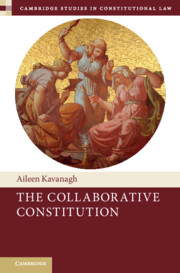Book contents
- The Collaborative Constitution
- Cambridge Studies in Constitutional Law
- The Collaborative Constitution
- Copyright page
- Brief Contents
- Contents
- Acknowledgements
- Abbreviations
- Introduction
- Part I Institutions and Interactions
- Part II Rights in Politics
- 4 Governing with Rights
- 5 Legislating for Rights
- 6 Legislated Rights
- Part III Judge as Partner
- Part IV Responsive Legislatures
- Bibliography
- Index
- Books in the series
5 - Legislating for Rights
from Part II - Rights in Politics
Published online by Cambridge University Press: 12 October 2023
- The Collaborative Constitution
- Cambridge Studies in Constitutional Law
- The Collaborative Constitution
- Copyright page
- Brief Contents
- Contents
- Acknowledgements
- Abbreviations
- Introduction
- Part I Institutions and Interactions
- Part II Rights in Politics
- 4 Governing with Rights
- 5 Legislating for Rights
- 6 Legislated Rights
- Part III Judge as Partner
- Part IV Responsive Legislatures
- Bibliography
- Index
- Books in the series
Summary
This chapter explores the role of the legislature in the collaborative constitutional scheme. It argues that the central role of the legislature is to scrutinise, check, and deliberate on policy proposals put forward by the Executive. The Executive proposes, whilst the legislature deliberates and disposes. Drilling down into the detail of legislative engagement with rights in the Westminster Parliament, this chapter showcases the Joint Committee on Human Rights (JCHR) as a key site for parliamentary deliberation and scrutiny on matters of rights. In this chapter, the JCHR is presented as a hybrid constitutional watchdog, which works alongside, and in collaboration with, other constitutional and accountability actors across the Westminster landscape.
Keywords
- Type
- Chapter
- Information
- The Collaborative Constitution , pp. 150 - 169Publisher: Cambridge University PressPrint publication year: 2023

